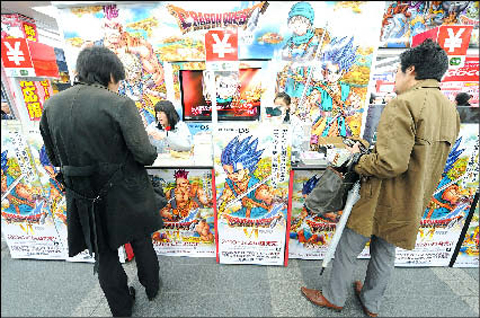Nintendo’s president shrugged off the just unveiled iPad tablet computer from Apple as delivering “no surprises” and displayed as little enthusiasm for 3D technology and high-definition upgrades for games.
Apple says the iPad is a new kind of mobile device that is more intimate than a laptop but is packed with more functions than a mobile phone.
“It was a bigger iPod Touch,” Satoru Iwata said of the much anticipated device shown on Wednesday by Apple Inc chief executive officer Steve Jobs.

PHOTO: EPA
Iwata denied speculation in Japanese media that what Nintendo Co has in the works in new gadgets may be a DS equipped with a motion-sensor similar to the wand for Nintendo’s hit Wii home console, or a Wii upgraded for high-definition TVs.
“I question whether those features would be enough to get people to buy new machines,” he said of the DS.
Nintendo engineers are developing new machines, he said, without giving details.
Iwata also doesn’t expect 3D video-gaming to catch on, although he welcomed 3D movies at theaters like James Cameron’s hit Avatar.
“I have doubts whether people will be wearing glasses to play games at home. How is that going to look to other people?” he said at a Tokyo hotel.
Separately, Japanese electronics group Fujitsu insisted on Friday it had been selling “iPad” mobile devices for years, spawning speculation over a possible trademark spat with Apple.
Fujitsu Ltd said its US subsidiary launched a sleek multimedia device, which allows retail store clerks to keep inventory data and manage other business operations, in 2002.
The US unit made a trademark application for the name “iPad” with the US Patent and Trademark Office in March 2003, Fujitsu spokesman Masao Sakamoto said in Tokyo.
The application is still pending and has not been registered, he said.
“As we are now sorting out the facts, we have not decided on what action we may take at the moment,” he said.

RESILIENCE: Deepening bilateral cooperation would extend the peace sustained over the 45 years since the Taiwan Relations Act, Greene said Taiwan-US relations are built on deep economic ties and shared values, American Institute in Taiwan (AIT) Director Raymond Greene said yesterday, adding that strengthening supply chain security in critical industries, enhancing societal resilience through cooperation and deepening partnerships are key to ensuring peace and stability for Taiwan in the years ahead. Greene made the remarks at the National Security Youth Forum, organized by National Taiwan University’s National Security and Strategy Studies Institution in Taipei. In his address in Mandarin Chinese, Greene said the Taiwan-US relationship is built on deep economic ties and shared interests, and grows stronger through the enduring friendship between

GAINING STEAM: The scheme initially failed to gather much attention, with only 188 cards issued in its first year, but gained popularity amid the COVID-19 pandemic Applications for the Employment Gold Card have increased in the past few years, with the card having been issued to a total of 13,191 people from 101 countries since its introduction in 2018, the National Development Council (NDC) said yesterday. Those who have received the card have included celebrities, such as former NBA star Dwight Howard and Australian-South Korean cheerleader Dahye Lee, the NDC said. The four-in-one Employment Gold Card combines a work permit, resident visa, Alien Resident Certificate (ARC) and re-entry permit. It was first introduced in February 2018 through the Act Governing Recruitment and Employment of Foreign Professionals (外國專業人才延攬及雇用法),

The Ministry of Transportation and Communications yesterday said that it would redesign the written portion of the driver’s license exam to make it more rigorous. “We hope that the exam can assess drivers’ understanding of traffic rules, particularly those who take the driver’s license test for the first time. In the past, drivers only needed to cram a book of test questions to pass the written exam,” Minister of Transportation and Communications Chen Shih-kai (陳世凱) told a news conference at the Taoyuan Motor Vehicle Office. “In the future, they would not be able to pass the test unless they study traffic regulations

EUROPEAN TARGETS: The planned Munich center would support TSMC’s European customers to design high-performance, energy-efficient chips, an executive said Taiwan Semiconductor Manufacturing Co (TSMC, 台積電), the world’s largest contract chipmaker, yesterday said that it plans to launch a new research-and-development (R&D) center in Munich, Germany, next quarter to assist customers with chip design. TSMC Europe president Paul de Bot made the announcement during a technology symposium in Amsterdam on Tuesday, the chipmaker said. The new Munich center would be the firm’s first chip designing center in Europe, it said. The chipmaker has set up a major R&D center at its base of operations in Hsinchu and plans to create a new one in the US to provide services for major US customers,